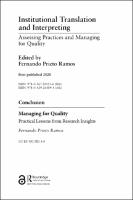Chapter Conclusion Managing for Quality
Proposal review
Practical Lessons from Research Insights
Abstract
Terminological consistency and accuracy are key indicators of institutional translation quality and a condition for semantic univocity and certainty with regard to legal terms translated at international organizations. They are accordingly important guiding principles in institutional terminology management. This chapter examines variations of consistency and accuracy levels in the translations of three selected terms that are representative of different degrees of legal asymmetry in English-Spanish translation, as well as the congruity of these translations with the recommendations found in the corresponding institutional terminological resources in three settings: the European Union, the United Nations and the World Trade Organization. The corpora compiled for diachronic comparison include all occurrences of the selected terms (“prima facie evidence,” “tort” and “magistrates’ court”) in two periods: 2005–2015 and 2016–2019. The findings suggest significant correlations between legal asymmetry and translation accuracy levels, and between intertextual consistency and accuracy fluctuations. They also reveal low adherence to the (limited) guidance of institutional terminological resources on legal system-specific terms. Additional qualitative insights are offered regarding the most significant cases of terminological harmonization and on the determining role of translation precedents.
Keywords
Institutional translation; institutional terminology management; legal terms; English-Spanish translation; translation studiesISBN
9780367210236Publisher
Taylor & FrancisPublisher website
https://taylorandfrancis.com/Publication date and place
2021Imprint
RoutledgeClassification
Language: reference and general


 Download
Download